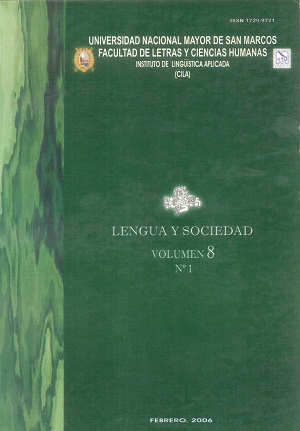Nominal derivation in the Umahua language
DOI:
https://doi.org/10.15381/lengsoc.v8i1.26503Keywords:
Composition, derivation, umahua, radical, root, suffixationAbstract
The purpose of this paper is to report on some aspects related to nominal derivation in the Umahua language, which is considered virtually extinct, based on the analysis of data collected from interviews with two bilingual (Umahua-Spanish) speakers in 2004 and from texts written by one of them in the same year. The data that complement this information are based on previous work on the Umahua and Cocama languages (both of which are part of the Tupi-Guarani linguistic family of Peru). In Umahua, derived nouns are formed by attaching the suffixes -suri, -wara, -qui- ra and -huasu to a root or radical of the same or different lexical category (derivation by suffixation) and by combining roots and radicals (derivation by composition). Compound nouns have as initial component a verbal or nominal form and as final component the nominal form siru or tupa.
Downloads
Published
Issue
Section
License
Copyright (c) 2006 Edinson Huamancayo Curi

This work is licensed under a Creative Commons Attribution 4.0 International License.
AUTHORS RETAIN THEIR RIGHTS
a. Authors retain their trade mark rights and patent, and also on any process or procedure described in the article.
b. Authors can submit to the journal Lengua y Sociedad, papers disseminated as pre-print in repositories. This should be made known in the cover letter.
c. Authors retain their right to share, copy, distribute, perform and publicly communicate their article (eg, to place their article in an institutional repository or publish it in a book), with an acknowledgment of its initial publication in the journal Lengua y Sociedad.
d. Authors retain theirs right to make a subsequent publication of their work, to use the article or any part thereof (eg a compilation of his papers, lecture notes, thesis, or a book), always indicating its initial publication in the journal Lengua y Sociedad (the originator of the work, journal, volume, number and date).



























